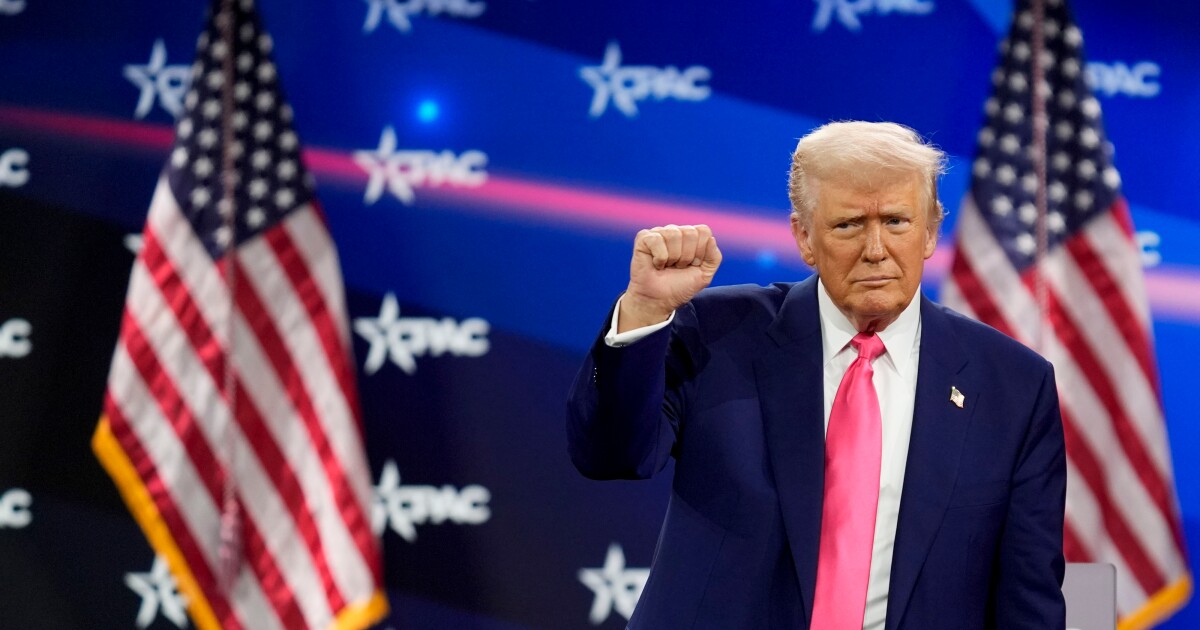President Donald Trump expressed optimism about negotiations in Congress to push forward his agenda on taxes and immigration, declaring that his party’s political movement will have lasting staying power in Washington.
Trump reprised many measures of his first month back in the White House in a speech to the Conservative Political Action Conference, telling the friendly audience he’s confident the Republican Party will beat the historical odds and avoid a voter backlash in next year’s midterm elections.
“I think we’re going to do fantastically well in the midterms.” Trump said. “We’re going to forge a new and lasting political majority that will drive American politics for generations to come.”
Trump’s remarks on Saturday wrap up another CPAC that offered rapturous support for the Republican president. Attendees over the course of this year’s three-day conference were treated to a parade of Trump allies, including members of his administration as well as foreign leaders who are in ideological lockstep with the Republican president on key issues.
Much of Trump’s agenda hinges on a spending package currently being debated by Republicans on Capitol Hill to extend his 2017 tax cuts and funnel money to immigration enforcement agencies. GOP divisions have played out in the House and Senate, with the chambers diverging on a single-bill versus a two-bill strategy.
Even as lawmakers wrangle over the approach to key measures, Trump said Senate Majority Leader John Thune and House Speaker Mike Johnson “have done a fantastic job” so far.
Budget hawks have set out to lower spending, although proposed changes to the tax code threaten to raise the nation’s deficit. Trump criticized lawmakers who disagree with the broader party’s approach, saying “every once in a while, you have one who wants a little action.” He added: “I just hate to see it, but they’re sticking together.”
The annual CPAC gathering outside Washington draws conservatives from across the world and has been friendly turf for Trump, including in the years when he was out of the White House. In 2023, he used an appearance there to fuel his reelection bid, even as polls at the time showed many GOP voters were open to an alternative, telling attendees that “I am your retribution.”
Last year, he spoke at the event with the Republican primary contest all but wrapped up, using his address to pivot to the general election contest.
Billionaire Elon Musk, the face of the president’s initiative to slash the federal government’s workforce and spending, appeared on Thursday wielding a chainsaw and a black cap emblazoned with Trump’s signature “Make America Great Again” slogan.
The chainsaw was given to Musk on stage by Javier Milei, the far-right populist president of Argentina, who has become a conservative icon for his efforts to use “shock therapy” to revitalize his country’s economy. He addressed the conference Saturday, saying he wants to be first in line to sign a free-trade deal with Trump.
Another Trump ally, Steve Bannon, sparked controversy during the conference when he extended his right arm with the palm down, in a gesture that resembled the Nazi salute. While Bannon denied making a Nazi salute, it led to Jordan Bardella, the president of the French far-right National Rally party, to cancel his speech.
Italian Prime Minister Giorgia Meloni, who has sought to position herself as a key Trump conduit to European leaders, spoke to the conference via video link.


 Economics1 week ago
Economics1 week ago
 Blog Post6 days ago
Blog Post6 days ago
 Economics1 week ago
Economics1 week ago
 Accounting1 week ago
Accounting1 week ago
 Personal Finance1 week ago
Personal Finance1 week ago
 Economics7 days ago
Economics7 days ago
 Personal Finance1 week ago
Personal Finance1 week ago
 Finance1 week ago
Finance1 week ago












